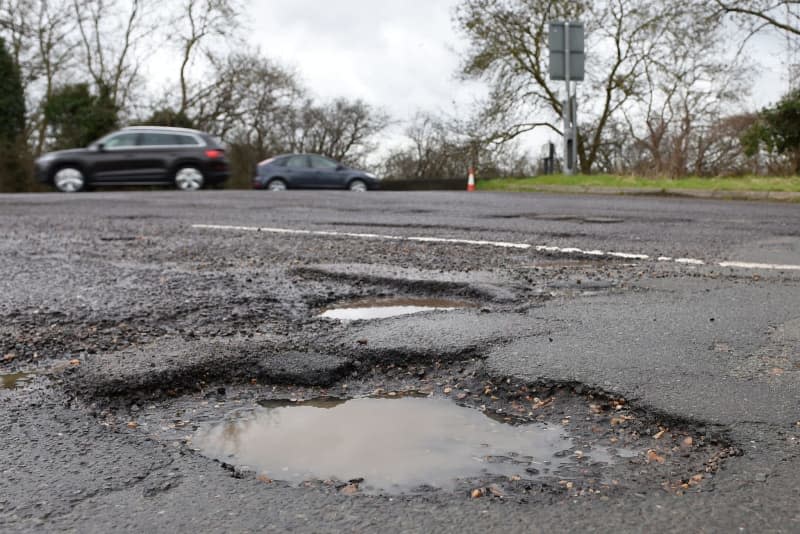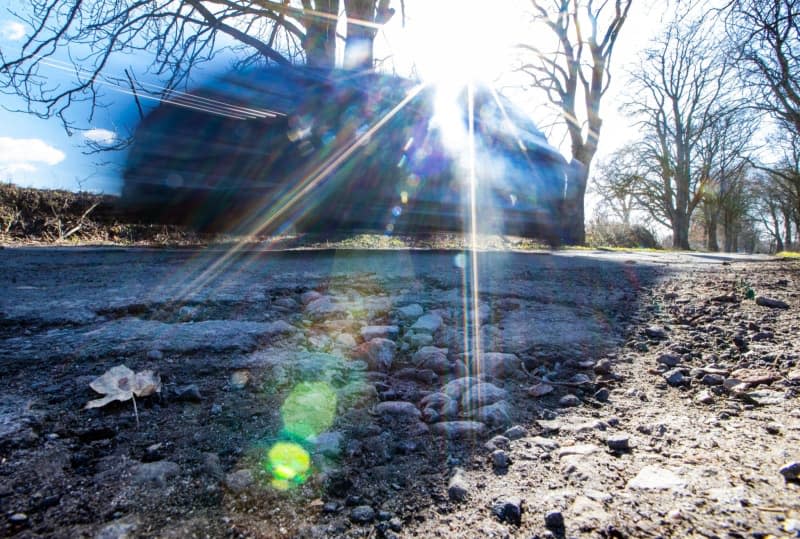Britain's streets beset by potholes, harmful for people and traffic

A glance at many of the streets in Britain shows little has changed since the days of the Beatles.
"I read the news today oh boy. Four thousand holes in Blackburn, Lancashire," the band sang back in 1967 in "A Day in the Life."
That was then, in the north-west English town. But since then, something does have changed. "Today it's probably more like 40,000," driving instructor Shaun Murray of Blackburn told the Guardian newspaper.
Potholes are very much headline news in Britain, sixty years on. They are still a plague for pedestrians and drivers alike. People even celebrate National Pothole Day in January to highlight the problem that they hope the authorities will fix. Some roads have so many holes, they resemble Swiss cheese.
There are around 1 million potholes across the country, according to an estimate by the transport service provider RAC. On the public roads of England and Wales, there are an estimated six potholes per mile (1.6 kilometres).
But a survey of 185 local councils in England does not provide the full details as only 81 - fewer than half - responded.
They had a total of 556,658 potholes in 2021/22 as of March 31, so the current figure is likely to be many times higher.
The opposition Liberal Democrats have described the situation as a "pothole pandemic."
"It's now become almost impossible to drive in some parts of the country without having to swerve to avoid potholes," says Helen Morgan, the party's local government, housing and communities spokeswoman.
In October 2023 alone, the car-drivers' Automobile Association was called out 52,152 times due to vehicles damaged by road defects. In the year as a whole, this amounted to more than 511,000 call-outs - far more than 1,500 per day.
"Broken roads and broken necks: life in pothole Britain" was the headline on an article in the Guardian newspaper.
Dangerous roads are increasingly expensive. The number of pothole-related claims rose by 40% in 2023 compared to the previous year, insurer Admiral recently said.
The average cost per incident also shot up by 29%, as vehicles are becoming more technologically sophisticated meaning repairs are less straightforward and more costly.
The season's wet and stormy weather is likely to lead to new potholes and for existing road damage to worsen, according to Admiral.
Cyclists are also at risk. And last year, one pensioner died after falling into a pothole 23 centimetres deep in Lancashire, where the Beatles' song began.
Feeling let down by the government, some people are taking the problem into their own hands.
Music star Rod Stewart was filmed in March 2022 personally filling a pothole near his property in Harlow. The road had been broken for years, he said at the time.
A stranger calling himself "Wanksy" - in reference to the mysterious street artist Banksy - also caused a stir by painting ejaculating penises around potholes. That effort has led to breakthroughs, with potholes often quickly repaired wherever his works appeared.
Others have also taken a humorous approach with television presenter Peter Levy jokingly asking viewers to send in photos of "their biggest holes" for BBC programme "Look North."
Some see hope in an announcement by the government that it will put £8.3 billion ($10 billion) to tackle the "pothole plague," as Prime Minister Rishi Sunak has dubbed the problem.
The sum would go towards repairing around 8,300 kilometres of roads over the next 11 years. A total of £150 million has been earmarked for this financial year and the next, with the remainder to be spent by 2034, which should save drivers up to £440 in repair costs.
But repairing potholes is one thing and maintaining the roads is another, says the RAC.
Could technology do the trick? The company Robotiz3d and the University of Liverpool have invented an anti-pothole robot.
Using artificial intelligence, ARRES, which stands for "Autonomous Road Repair System," is designed to recognise and fill potholes.
Scientists are gearing up to test the machine under real conditions.
Perhaps at some point, the nation will be humming another Beatles' song - "Fixing a Hole."


